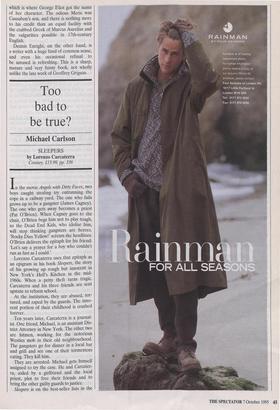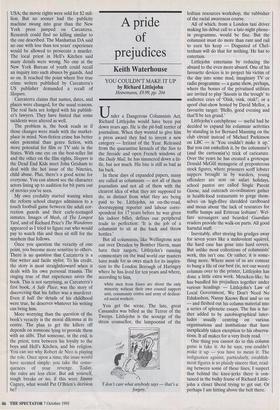Too bad to be true?
Michael Carlson
SLEEPERS by Lorenzo Carcaterra Century, .115.99, pp. 336 In the movie Angels with Dirty Faces, two boys caught stealing try outrunning the cops in a railway yard. The one who fails grows up to be a gangster (James Cagney). The one who gets away becomes a priest (Pat O'Brien). When Cagney goes to the chair, O'Brien begs him not to play tough, so the Dead End Kids, who idolise him, will stop thinking gangsters are heroes. 'Rocky Dies Yellow!' scream the headlines. O'Brien delivers the epitaph for his friend: 'Let's say a prayer for a boy who couldn't run as fast as I could.'
Lorenzo Carcaterra uses that epitaph as an epigram in his book Sleepers, the story of his growing up rough but innocent in New York's Hell's Kitchen in the mid- 1960s. When a petty theft turns tragic, Carcaterra and his three friends are sent upstate to reform school.
At the institution, they are abused, tor- tured, and raped by the guards. The inno- cent portion of their childhood is crushed forever.
. Ten years later, Carcaterra is a journal- ist. One friend, Michael, is an assistant Dis- trict Attorney in New York. The other two are hitmen, working for the notorious Westies mob in their old neighbourhood. The gangsters go for dinner in a local bar and grill and see one of their tormentors eating. They kill him.
They are arrested. Michael gets himself assigned to try the case. He and Carcater- ra, aided by a girlfriend and the local priest, plot to free their friends and to bring the other guilty guards to justice.
Sleepers is on the best-seller lists in the USA; the movie rights were sold for $2 mil- lion. But no sooner had the publicity machine swung into gear than the New York press jumped on Carcaterra. Research could find no killing similar to the one described. The Manhattan DA said no one with less than ten years' experience would be allowed to prosecute a murder. The local priest in Hell's Kitchen said many details were wrong. No one at the New York Bureau of youth could recall an inquiry into such abuses by guards. And so on. It reached the point where five true crime writers published by Carcaterra's US publisher demanded a recall of Sleepers.
Carcaterra claims that names, dates, and places were changed, for the usual reasons. The real facts are lodged with his publish- er's lawyers. They have hinted that some incidents were altered as well.
The problem is, the book reads as if those changes were made with the market- place in mind. Non-fiction crime has better sales potential than genre fiction, with more potential for film or TV sale in the States. With one eye on the best-seller list and the other on the film rights, Sleepers is the Dead End Kids meet John Grisham to deal with the hot issue of the Nineties, child abuse. Plus, there's a good scene for everyone. You can almost see the character actors lining up to audition for bit parts out of movies you've seen.
My own credulity started waning when the reform school charges admission to a touch football game between the adult cor- rection guards and their early-teenaged inmates. Images of Mash, of The Longest Yard, and of Richard Price's The Wanderers appeared as I tried to figure out who would pay to watch this and then sit still for the mayhem that follows.
Once you question the veracity of one point, you become more sensitive to others. There is no question that Carcaterra is a fine writer and facile stylist. To his credit, the story is most straightforward when it deals with his own personal trauma. The ringing true of that experience saves the book. This is not surprising, as Carcaterra's first book, A Safe Place, was the story of discovering that his father was a murderer. Even if half the details of his childhood were true, he deserves whatever his writing can bring him.
More worrying than the question of the book's veracity is the moral dilemma at its centre. The plan to get the killers off depends on someone lying to provide them with an alibi. That someone, in the end, is the priest, torn between his loyalty to the boys and Hell's Kitchen, and his religion. You can see why Robert de Niro is playing the role. Once upon a time, the issue would have seemed simple: you take the conse- quences of your revenge. Today, the rules are less clear. But ask yourself, tough breaks or no, if this were Jimmy Cagney, what would Pat O'Brien's decision be?











































































 Previous page
Previous page